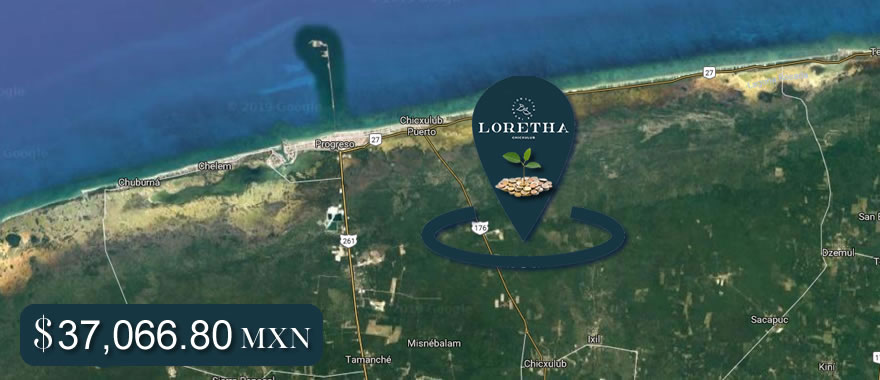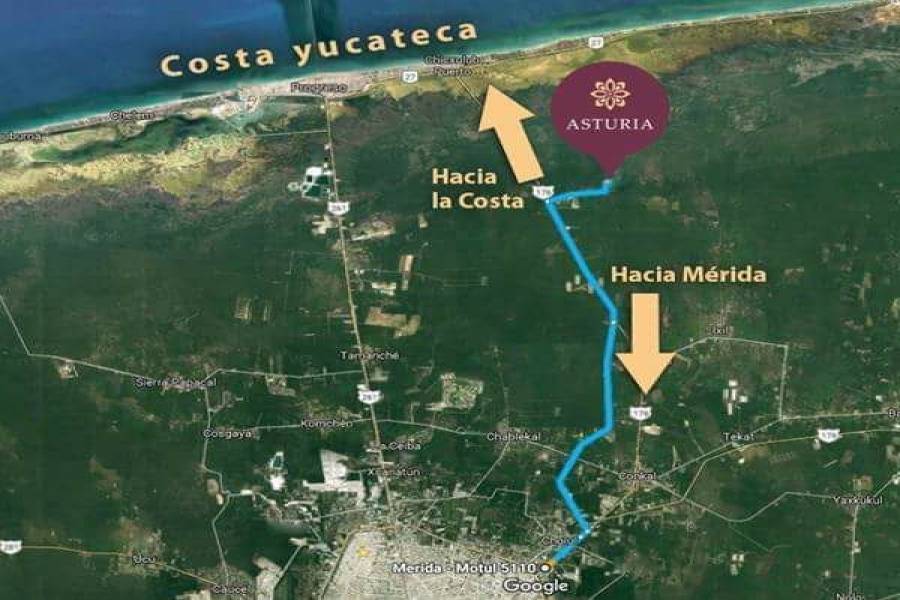Real estate fraud in Celestun, Sisal, Caucel, Hunucma, Northern Merida, and Conkal corridos are prevalent

The explosive growth of the so-called ” investment lots ” in Yucatan in recent years has sparked the discussion about whether the purchase of these is an advantageous business or simply a monumental fraud.

Many companies in charge of selling these lots offer properties ” ten minutes from the beach ” or “five minutes from large shopping centers and universities”, at affordable prices, with payment facilities, and with the promise of becoming a profitable instrument of savings. and high capital gains in the future.




However, these “investment lots”, according to data collected by reporters from Central 9, Grupo Megamedia’s Journalistic Investigation Unit, are, in many cases, old ejido properties located in the middle of nowhere, without paved access roads and devoid of urban services that, in practice, are worth nothing and that is why some already call them ” junk lots “.

The sale of these lands has been so large that some anticipate the formation of a ” speculative bubble ” very close to bursting, given the apparent passivity of the authorities
Characteristics of investment lots in Yucatán
Reporters from Central 9 visited several of these investment lots – it is estimated that there are more than 40 projects of this type, concentrated in a few companies – which in general, with few exceptions, offer the following characteristics:

They are, in effect, in the middle of nowhere , far from population centers. Its access roads, in most cases, are not paved, but are white roads.
The interior streets are also white roads or streets in brush and poorly drawn. Many do not have minimal urban services, that is, electricity, drinking water, drainage, garbage collection, and so on.

In fact, in some cases, the development companies sell them like this, as ” semi-urbanized land .” The lots of the same development are not divided among themselves, except for some that do it with cairns.
Without municipalization
Furthermore, most are not municipalized, so they will not be able to receive basic services from the municipalities. To obtain these services, without government help, the owners must establish a condominium regime, although that means paying very high fees for construction and maintenance of services.
Some developments, to disguise these deficiencies, raise an attractive entrance with access arches, 200 meters of paved street and information offices, and others even provide the services of a ” clubhouse “.
According to the data obtained, the “investment lots” measure from 400 to 500 square meters on average and their prices range between 50 and 1,200 pesos per square meter.

Cash or “to months without interest”
Some companies sell cash. For example, 50,000 pesos for a 500-meter lot. Others propose to give down payments of ten percent and payments to 12, 18 and 24 months, “without interest.”
The lots are located mainly in the municipalities of Mérida, Progreso, Conkal, Motul, Baca, Chicxulub Pueblo, Telchac Pueblo and Hunucmá. Its sellers, in all cases, consider these lands as properties located in areas of high capital gain and “a great investment opportunity for the future.”

In their ads they say that they are a few minutes from the beaches of Telchac , Progreso or Chuburná Puerto or near the large shopping centers of Mérida, the university and hospital area, the Science Park, the industrial axis of Hunucmá or the Mérida-Cancun highway.
The advertisements, however, do not specify the access roads to these places, since in many “investment lots” narrow roads prevail, in some cases unpaved.

Cheap lots with no value
According to Luis Felipe Noyola Rivera, director of Economic Analysis of the Baldovinos & Novoa office in Mexico City, specialized in market studies in the real estate sector, the attractions of Mérida as an area conducive to investing in real estate – due to its demographic and economic growth and Its high level of security, brought about the phenomenon of “investment lots”, with its offer of cheap land, but far from the cities and without services and, in the end, in many cases, without any value.
This business was born almost ten years ago when several groups of investors acquired ejidal lands at very low prices to resell them later, with huge profits, as “investment lots or country lands,” explains Noyola Rivera, author of a study on the real estate market in La Peninsula.
They did it with very little infrastructure and following the trend of this type of business originating in the center and north of the country, he adds.
Alleged future capital gain
“These investors brought ejidal lands to the market with very little value and at excessive prices and convinced hundreds of Yucatecan buyers and those from other parts of the republic of the potential of those properties to earn a lot of capital gains over the years, due to the real estate growth of Mérida.”
“The belief in the potential value of these properties generated a speculative movement. This, in turn, led to an increase in the number of people interested in these lands, increasing prices, although there was no logical reason for that, in many cases” .
According to the specialist, in order to meet the growing demand, investors increased their purchases of ejido land and created more “investment lots” and with it a speculative spiral.
“Housing bubble”
As prices skyrocket, buyers believe that they will continue to grow, so that the price of lots does not stop increasing, generating an economic upheaval known as a ” real estate bubble ,” says Noyola Rivera.
“This bubble will burst when buyers, wanting to sell their properties, will not be able to do so because their lands are remote, without services and without economic value,” warns the interviewee.

The trafficking of ejido land is also reaching a critical point in Yucatán and has a high possibility of igniting a political, social, and economic conflict.
In this sense, Dr. Othón Baños Ramírez warns that this traffic has led to a new problem. “A lot of people spent all their money to buy a lot to build their house and all they receive is a lot in the jungle with no infrastructure.
After the ejidatarios, there are those people who bought vacant land, office projects, drawings, proposals on paper. “Those are the losers today because they invested their savings with the aspiration that the purchased land would gain capital gain, be worth more over time.”
Disappointed with lots located in the middle of nowhere
The trafficking of ejidal lands has its main victims among the peasants and the sprawling and uncontrolled urban development of Mérida, but they are not the only ones. The implications and negative effects of speculation reach many other sectors of the population.
Regarding the ejidatarios, Dr. Othón Baños Ramírez comments that they found themselves alone in the face of speculators, who took advantage of their need to pay ridiculous prices for their lands. “No one addressed this problem, neither the government people nor the civil society people did something to advise the peasants so that they became more aware of their heritage, which they were about to lose.”
The problem is that due to the conditions of extreme poverty in which they live, the peasants of the henequen area cannot afford the “luxury” to think about what may happen in the future, says the professor and researcher of the Science Unit Social Studies of the Regional Research Center of Uady, in the second part of the conversation with the newspaper.
“Their needs are immediate, urgent,” he continues. “Sometimes they resist in the first instance, but an illness, an urgent or unexpected problem requires them to have some money and they are forced to resort to that file in the worst conditions imaginable.”
That was the situation, he explains. The reform of article 27 of the Constitution led to a new Agrarian Law in 1992, which generated an evolution from collective property to private property and allowed the privatization and sale of ejidal lands.
“In this neoliberal context, with the modification to the Agrarian Law, the ejidatarios became subjects of the market. From then on they are elements not of a social sector, but of a commercial sector and that is where they lose that quality and begin to lose all their assets, ”he adds.
A new problem
The trafficking of ejido land is reaching a critical point in Yucatán and has a high possibility of causing a political, social, and economic conflict to break out, as we pointed out a few days ago in a report by Central 9, the Special Investigations Unit of Grupo Megamedia.
In this sense, Dr. Baños Ramírez warns that land trafficking has led to a new problem today. “There are a lot of people who spent all their money on the acquisition of a lot to build their house. They sold jungle, empty dreams. Those people are the other victims of speculation ”.
The land grabbers annoyed the ejidatarios a long time ago and now they are doing the same with those who bought land from them. “
Dr. Othón Baños Ramírez, researcher
Those people who bought vacant land, beach lots, office projects, drawings, proposals on paper. “Those are the losers today because they invested their savings with the aspiration that the purchased land or project would be completed, would gain capital gain, be worth more over time.”
“That is not happening now nor is it going to happen soon,” assumes the researcher. “The market is saturated and the urban development projects in these lands, the provision of infrastructure, are stopped and will continue like this for a long time.”
They were deceived
Those people have been deceived. We do not know yet how many they are exactly, but surely there will be a reaction when they see that their land is left there, abandoned and that the projects they were offered are postponed or even canceled because they were simply a marketing hook, a scam.
In other words, the land traffic market has formed a bubble that is bursting, he says. That is what we are seeing now and we will continue to observe for a while longer until people are aware of the situation.
“At any given time, the complaint of many people will appear because the urban projects that they were promised are impossible to carry out, given the current conditions and trends,” conjectures Dr. Baños. “The phenomenon of speculation began to deflate months ago, but as a result, we began to see the situation more clearly.”

Government role
For the Uady investigator, government intervention seems unlikely at the present time, although it would be convenient if it did, not to “fix” what has already happened, but to stop the chaotic, excessive growth of Merida.
The authorities should apply the law in accordance with the development regulations, he says. That is, they would have to require real estate companies that their developments have all the services before starting to sell the lots.
“It has to be that simple, but it is precisely what is not happening. The requirement for developers to put all urban services on before they put the first plot of land up for sale aims to protect citizens, give them the certainty that their lot will not actually remain in the jungle, in the middle of nowhere. Give them the assurance that they didn’t spend their money on a simple paper project. “
Against plunder
Efforts to straighten things out should be directed there. “The people who were deceived should organize and sue for the government to demand that these development companies return their money and compensate them, he insists.
It is difficult that there can be a specific law against land speculation, he considers. But if the government really applied the law, if it demanded that the Urban Development Plan – which almost all municipalities already have – be respected, if it forced adherence to the regulations, it would advance in the solution of this problem.
The key point is, insists Dr. Baños, that the government requires companies that before they start to market it, the project is fully urbanized, that they have all the services: water, electricity, public transport, garbage service, etc. .
It’s illegal to sell a development without all permits in hand, city, state and federal.
“That would have to be ensured to prevent buyers from being misled and scammed. Otherwise, they are making speculation about the land and the jungle. They are only selling illusions that are never going to come true. Marketing sells everything… the only thing the government has to do is protect the people ”, he concludes.
There is no guarantee that the city will grow there
Apparently, another risk for “investment lots” is the change in urban development policy in Merida. In the next few years, this will favor inward growth, increasing the demand for properties incorporated into the city and abandoning the expansive model.
READ MORE BELOW ABOUT YUCATAN TOXIC WATER
Source: yucatan.com.mx, eluniversal.com.mx, Hernán Casares Cámara






